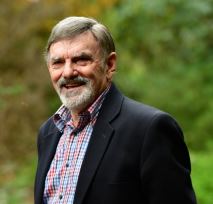We recently caught up with the fascinating Dr Andrew Paterson and asked him to share a bit about his journey and what he’s working on post PhD:
How did you come to do a PhD and why?
During my career I had a couple of attempts to build on my post-grad social work degree but something career related always got in the way. The Ash Wednesday fires in 1983 is an example. After I came to Flinders as a Field Education Coordinator in 2010 a couple of academic colleagues suggested that I should write about my long career in the Justice system. That became a PhD idea when I grabbed the opportunity to research resilience rather than the negative impact of trauma.
I had worked with police right through my career and had long been aware of the challenges around what police see and do so that’s where I headed.
Was the PhD experience what you thought it would be and how has it assist you?
What it would be like I had no idea about that. I saw myself as a practitioner rather than an academic. My first supervisor, Professor Fiona Verity suggested I should focus on scholarship. That worked for me. I enjoyed being focused on one task with no distractions for the 2 years I was a full time RHD candidate. That was a new experience. I was consumed by the opportunity to research the topic thoroughly and gathered confidence as I went along.
It certainly gave me increased confidence in my teaching. It changed the way I think and how I read and research. I certainly think more critically and enjoy open debate much more than I did.
What were some memorable points in your learning and the impact of your research?
When I focused on Posttraumatic Growth theory I realized that my learning experience around trauma that for practitioners working in the area of trauma wasn’t dangerous to my health but rather a learning opportunity and a privilege. Positive psychology was also an important discovery. I enjoyed research that confirmed my experience as well as research that challenged it.
In regards to impact, there have been many outcomes in terms of feedback from those who have read the thesis, many of them coppers, and those who were encouraged by it.
How did you build rapport with the 50 police officers you interviewed for your qualitative study?
Having worked so long with police, I knew their language and many of them knew me, at least by reputation. My social work skills in building rapport learnt over years of working with crime victims and offenders were a real asset as well as the fact that most of the officers had not had a conversation like ours before.
What other research has been able to leverage and evolve from yours that you are aware of?
I have had a lot of feedback from police officers who found it encouraging and readable, some from professionals who work in the field developing programs, some from other students who had not come across interviews of this depth before but not much so far from other researchers.
What are your thoughts about how police organisations manage the well- being of their members?
They have come a very long way in the last 20 years or so but there is still much to do. Early Intervention is the key to promoting well-being among all first responders, but first, you have to manage them appropriately without bullying as is the tendency with “command and control” management and give them the confidence to seek help and support when they need it without career-related reprisals. I am also very interested in the transition into retirement for police. I am developing some research proposals around that with Associate Professor Gerry Redmond in Business, Government, and Law.
What are you currently working on? Is it true that you have been approached to contribute to a TV Police drama series?
I have just submitted a book proposal based on the thesis and I have 2 research proposals in train one I mentioned earlier. I am also a member of a team led by Associate Professor Ben Wadham into military veterans transitioning out of the ADF into University and civilian life.
I don’t plan a career in academe so I have many options in other areas. I am in conversation with some colleagues around the transition process from Uni to work, particularly in Social Work and I continue to work with Anthony Stone Consulting as a trainer in dealing with aggression in the workplace.
Yes I have been approached by a TV production to advise them on policing and trauma/resilience/diversity which will be fun. It’s a very interesting project to be filmed in Adelaide.
What is your best advice to current HDR students?
Find a fabulous supervisor who is a skilled researcher and who can bring out the very best in you. Don’t feel overwhelmed by the task, treat it like a job and submit as quickly as you can. Enjoy the privilege.

